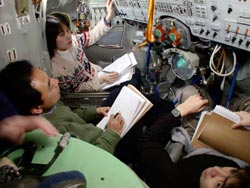 |

For example, an oral examination went as follows:
I was asked, "What should the crew do when he finds an anomaly in the main attitude control system as he tries to change the orbit by employing a reverse thrust during re-entry?"
The correct response should be, "The crew should just observe the system because it will automatically switch itself into back-up."
Then I was additionally asked, "And what if the engine shuts off?" I should answer, "The crew should wait for the engine to switch into back-up, and then turn it on manually."
There are several ways for troubleshooting the same problem depending on the situtation and in which order it happens; for example "engine shut-off." In order to respond to these situations, and in order to know if all we need to do is to observe or need to actively operate the system, we need to understand the system as a whole
In order to do so, from my experience as a doctor, I studied the Soyuz system by replacing it with the human body mechanism like "the computer system is a central nervous system, the electric power system is circulatory organs, etc."
In addittion, from my experience of being a clinician, there has been situations when one has to make judgements even if one is not 100 % confident. In such cases, one has to make decision by comparing risk and benefit (of the treatment) before it becomes too late, not forgetting the observation of the patient's status. From these points, I feel that being an astronaut is similar to that of a clinician.
To say more, my experience in anesthesiology also helped me.  Even though I was a surgeon specializing in digestive organs, I also went through in-service training for anesthesiology. When doctors from different specialties work together, good communication is imperative. A surgeon who actually performs an operation and an anesthesiologist who takes care of a patient's body and health have different interests and priorities concerning their patient. Even though I was a surgeon specializing in digestive organs, I also went through in-service training for anesthesiology. When doctors from different specialties work together, good communication is imperative. A surgeon who actually performs an operation and an anesthesiologist who takes care of a patient's body and health have different interests and priorities concerning their patient.
I am confident that I was able to communicate effectively thanks to my experience in anesthesiology as a surgeon. I actually felt that the relation with the commander when I am aboard the Soyuz would be similar to that with another doctor in an operation room.
The difference from the medical field is that cosmonauts have a manual called "On-orbit Document" for operation procedures and anomalies. However, if we make a better judgment based on proper understanding, and if that produces good results, that will be highly appreciated even if that operation does not follow the procedure in the manual. I think this example shows one aspect of how Russia places greater emphasis on skills.
|
 |
3/4 |
 |
|
 |